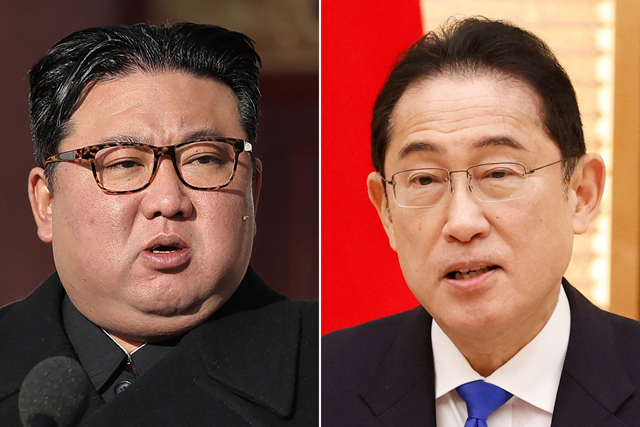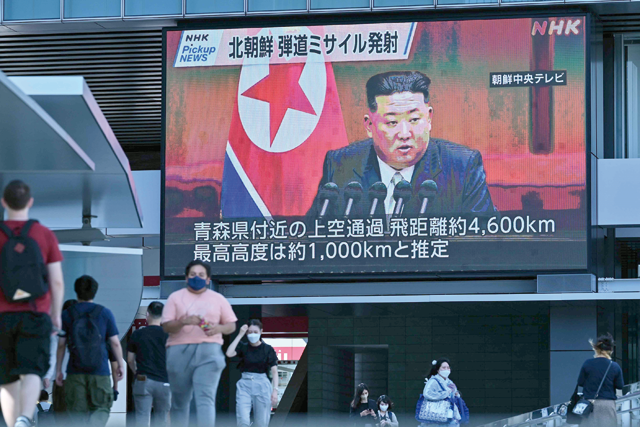You are here
N. Korean abductions of Japanese remain contentious issue
By AFP - Mar 25,2024 - Last updated at Mar 25,2024

North Korean leader Kim Jong-un (left) delivering a speech at the ministry of national defence in Pyongyang on the occasion of the 76th founding anniversary of the Korean People’s Army, and Japan’s Prime Minister Fumio Kishida delivering a speech during the graduation ceremony of the National Defence Academy in Yokosuka, Kanagawa prefecture on Saturday (AFP photo)
TOKYO — The abductions of more than a dozen Japanese people by North Korea in the 1970s and 80s remain a contentious and emotional issue in Japan.
Although Pyongyang says the matter has been settled, the Japanese government has pledged to resolve the issue that has long been a major obstacle to improving ties.
The powerful sister of North Korean leader Kim Jong-un said on Monday that Japan’s prime minister had requested a summit with her brother — but added that a meeting was unlikely while Tokyo remains “engrossed in the abduction issue”.
Here are some things to know about the kidnappings:
Training spies
After years of denial, North Korea admitted in 2002 that it had sent agents to kidnap 13 Japanese people who were used to train spies in Japanese language and customs.
Tokyo says at least 17 young people disappeared from coastal areas facing the Sea of Japan — the youngest of whom was Megumi Yokota, kidnapped on her way home from school in 1977 at the age of 13.
North Korea allowed five of the abductees to return to Japan after its admission, but Pyongyang insisted the other eight were dead, including Yokota.
In 2004, the North handed over cremated remains it claimed were Yokota’s, but Tokyo said DNA tests conducted in Japan proved the claim to be untrue.
Japanese police say there are 800 missing people for whom the possibility of being kidnapped by the hermit state cannot be ruled out.
Ageing families
Yokota’s parents led a long and emotional campaign to keep the subject in the national consciousness despite a lack of any breakthrough.
Her father Shigeru passed away aged 87 in 2020, but Yokota’s mother Sakie says she still hopes to see her daughter alive.
North Korea’s statement that Prime Minister Fumio Kishida had requested a summit with Kim raised hopes among the families of those kidnapped by Pyongyang.
Sakie Yokota told Japanese media on Monday that she wanted the two countries to hold talks “as soon as possible”.
“I hope even a small step will be made. We really don’t have much time left,” the 88-year-old said.
Slow progress
The issue, which is never far from the domestic news agenda, has coloured Japan’s attitude to its neighbour for decades.
In 2002 and 2004, then-Japanese Prime Minister Junichiro Koizumi visited Pyongyang and met with then-North Korean leader Kim Jong-il, signing a declaration to resolve the kidnapping issue and other sore points.
Then, under an agreement brokered in Stockholm in May 2014, North Korea undertook to reinvestigate all abductions of Japanese citizens in what appeared to be a significant breakthrough on the issue.
And in 2017 and 2019, then-US President Donald Trump met families of those abducted and pledged to work with Japan to bring them back. But there has been almost no progress since then, as relations between the North and the international community have deteriorated.
Stalemate
Experts say it will not be easy to resolve the issue.
“From Japan’s perspective, North Korea is entirely at fault for carrying out abductions in violation of international law and infringing upon Japan’s sovereignty,” Daisuke Kawai, deputy director of the University of Tokyo’s economic security research programme, told AFP in February.
“However, from North Korea’s perspective... they made a concession by admitting to the abductions and returning some of the abductees, despite previously denying such actions.”
This concession “led to a hardening of attitudes in Japan, without providing any economic benefits or reciprocation to North Korea”, so it’s “natural” that Pyongyang will be reluctant to do the same again, he said.
Related Articles
SEOUL — Pyongyang said on Friday it had “nothing to talk” about with Japan after claiming that a Japanese diplomat in China had made contact
SEOUL — North Korea fired a ballistic missile over Japan for the first time in five years on Tuesday, prompting Tokyo to activate its missil
SEOUL — North Korea fired a ballistic missile over Japan for the first time in five years on Tuesday, prompting Tokyo to activate its missil

















